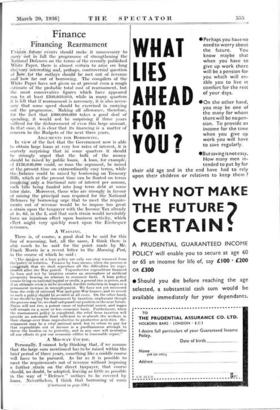Finance
Financing Rearmament
UNLESS-future events should make it unnecessary to Carry out in full the programme of strengthening the National Defences an the terms of the recently published White Paper, there is almost certain to arise ere long th'verY interesting 'and,. perhaps, controversial question of ' Ito "w- fail the outlays should be met out of revenue ,-, ., should an how fat out of borrowing. The compilers of the White Paper have not given us at present even a rough estimate of the probable total cost of rearmament, but the most conservative figures which have appeared run._ to at least £300,000,003, while in many quarters it is felt that if rearmament is necessary, it is also neces- sary that some speed should be exercised in carrying out the programme. Making all allowance, therefore, for the fact that £300,000,000 takes a good deal of spending, it would not be surprising if three years sufficed for the disbursement of even this large amount. In that case, it is clear that its financing is a matter of concern to the Budgets of the next three years.
ARGUMENTS FOR BORROWING.
In view of the fact that the Government now is able to obtain large loans at very low rates of interest, it is scarcely surprising that in some quarters it should be strongly urged that the bulk of the money should be raised by public_ loans. A loan, for example, of £150,030,000 could, so runs the argument, be raised at thei,ptesent time on extraordinarily easy terms, while the balance ' could be raised by borrowing on Treasury Bills, which at the present time can be floated on terms inykatviriepnly_a fractional rate of interest per annum, such bills being funded into Jong term . debt at some later date. Moreover, those who are strongly in favour of- raising the principal sum required for the National Defences by: borrowing urge that to - meet the require- ments out of revenue would be to impose too great a strain upon the taxpayer with the Income Tax already at 4s. 6d. in the £, and that such strain would inevitably have an injurious- effect upon business activity, which effect might very quickly react_ upon the Exchequer revenues.
A WARNING. , there is, of course, a good deal to be said for this line of reasoning, but, all the same, I think there is als0 much to be said for the point made by Mr. Frank Morris in a recent letter to the Morning Post, in the course of which he said : )Thndantleni of :a loan: policy are only one step removed from the%poli6-4.of inflation. Finance by loan means, when the process is coingletfpct; that we shall reproduce all the difficulties we expo- rienEed- after..the War,, period. Unproductive expenditure financed by loan and not by 'taxation creates an atmosphere of artificial prosperity bearing no relation to economic facts. A loan policy means living on national bap-ilia or credit, a general rise in prices, and if an ultiiiiite crisis is arim'evoided, forcible reduction in wages or a permanent increase. in unemployment. We have not yet recovered from the evils of unioun4 War and-post-War finance, and to revert to such a polickshOld tte avoided at all costs. On the other hand, if we decidetto Imp/Or rearmament by taxation, unpleasant though the process may-be; we shall safeguard our position in the near future. Prices will not rise, a potent cause of industrial unrest, and wages will remain-on a, more or less economic basis. Furthermore, when
the rearmament coinpleted, the relief from taxation will provide an' autothat e' fund sufficient to re-absorb the workers in their change-over from unproductive to productive activities. Re- armament maybe a _vital national need, but, to refuse to pay for that expenditure out of income is a pusillanimous attempt to throw the burden on to posterity, and in any case will neutralise all our. efforts to put our economic edifice in reasonable repair."
A MID-AWAY COURSE.
- ' - . - •
Petsonally, cannot help thinking that, if we assume that the large sum mentioned has to be raised within the brief period of three years, something like a middle course will have to be- pursued. As far as it is possible to meet the requirements out of revenue without imposing a further ,strain on the direct ..taxpayer, that course should, .no-doubt, be adopted, leaving as little as possible in the way of " Defence " outlays to be covered by loans. Nevertheless, -I think that borrowing of some (Conlinucd-on page 356.)


































































 Previous page
Previous page